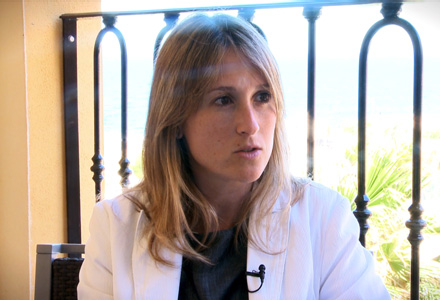 In this two-part interview of this month’s Viewpoint, Becky Liggero sits down with Quirino Mancini from Italy and Gayle Kimberly from Malta. The second part of their interview tackles why a license from a jurisdiction such as Malta isn’t good for operating in Italy, the likelihood of jurisdictions such as Italy working together with jurisdictions that include multiple regions like Malta and what the future holds for the jurisdictions that cover multiple geographic regions.
In this two-part interview of this month’s Viewpoint, Becky Liggero sits down with Quirino Mancini from Italy and Gayle Kimberly from Malta. The second part of their interview tackles why a license from a jurisdiction such as Malta isn’t good for operating in Italy, the likelihood of jurisdictions such as Italy working together with jurisdictions that include multiple regions like Malta and what the future holds for the jurisdictions that cover multiple geographic regions.
Becky: So why isn’t a license from a jurisdiction such as Malta good for operating in Italy?
Quirino: Back in time, they could reasonably say come talk to my place, come to Malta, come to jeep(inaudible), roads are clear and they are casting stone and the infrastructure works so you will be all set. They could say that back in time also on grounds that… under the treaty of Rome, under the principles of European chart, if you are European and you are based anywhere in Europe you are entitled, fully entitled to…you know… move across European territory and offer services across the borders.
They were not however taking into consideration the state monopolies on gaming and the fact that at national level every country is very jealous of its taxing prerogatives. This was something that initially was received very badly in places like Malta and so they are very smartly repositioning themselves and for instance they are providing a full package of services provided for Malta and are aimed at the tiny market. The only thing being that if you have your service in Malta you will have to get that server, connect it in real time to the central control system in Italy.
But because its Malta, because its Europe, you can keep your server there so it’s just about reviewing your plans and adapting to a situation that like it or not is happening. The LGA may or may not like what AMS is doing, AMS being the Italian regulator or ARJEL is doing the French regulating. But guess what? They will go their own way with or without the LGA so they’d rather package new ways of offering their services which are still very competitive, price wise and skills wise, know-how wise, etc.
Gayle: Well this is the issue. Of course, you have to remember that gambling historically has always been seen as a vice. Now this has developed into gaming, into entertainment, into games of skill you know, it’s no longer the vice of people, you know, locked up in their rooms smoking and burning away all their earnings. Now it’s become a form of entertainment so I think one historically member states come from this tradition of banning. Secondly, they fear anything to do with the internet.
I think a lot of people have this preconceived idea that it’s out there, that it’s online and that we can’t control it and that it’s automatically bad so it’s easier to ban. And thirdly, deep down they want to protect the public purse. You know they want to have their money from the revenues they generate and this is why a lot of countries have monopolistic structures because of course they will claim that you know, this is to protect consumers but ultimately it’s a huge revenue for these member states. However again, in accordance with EU law, you cannot restrict just for tax reasons.
Becky: So what’s the likelihood of jurisdictions such as Italy working together with jurisdictions that include multiple regions like Malta?
Quirino: For as much as I know of both jurisdictions, they’re very reliable jurisdictions… they are not the kind of, you know, banana island that one might be led to think simply in because they do not carry proper European plates. They themselves stand a chance to enter into some kind of operational arrangements with countries like Italy. But this is going to take time and as ever, we will, it’s a slow process.
There have been talks, there have been discussions about it. I am deeply convinced that it’s just a matter of setting a precedent. So in my view it will be a domino effect so other such deals will follow and then in the long run, we will get to a situation where even the AGCC in Alderney, or the GSC in the Isle of Man will be able to join in and enter into these agreements.
Gayle: If we look in the last 10 years of how it’s developed, the gaming industry’s developed, at least from a point of view a regulatory and legal… it’s developed and we’re moving slowly. Mind sets are changing, member states are realizing that they can’t keep restricting because the market’s there, consumers want it and they’re gonna find a way to do it. And in fact we’ve been inundated on a European level with illegal operators, black market who hold no license whatsoever. So while you’re going to keep restricting the market, you’re not actually going to stop it.
I very much believe that the crusade that we’ve been doing should continue because once you have a valid license from a country like Malta, it’s very difficult from an EU perspective for member states to block those operators. It’s not as easy people think. So if they’re complacent and say, ‘Right I’m gonna go ahead and have to get a license in every member state’ then that will defeat the purpose and the fight for EU integration and the more we continue doing it, the more this is gonna happen.
One wouldn’t have thought 10 years ago that the European commission would launch a consultation on this. Why? Because they’re seeing that there’s a problem so something will be done. It just takes time. So I think they should defend their license, get a license from a robust regulator regime because it’s much easier to do the crusade, the internal market crusade and then fight the cause. The developments hopefully if there’s no political will to do it on a legislative level, the court is slowly, slowly helping so I don’t think that the future is 27 national licenses.
It looks like that at the moment but if you look at them, they’re slowly opening up their markets because they’re realizing that if they don’t do it, they’re going to have to deal with illegal black operator…black markets and consumers are not protected anymore.
Becky: So what does the future hold for the jurisdictions that cover multiple geographic regions?
Quirino: Honestly speaking, I see no great future for these jurisdictions at least as far as Europe is concerned. Either they will make an effort to introduce themselves to the European regulators and to convince them that they are not just a very nice location in terms of great infrastructure and great facilities, etc. But they are willing to, you know, abide by the European regulations and legislation not just in matters of gaming but more generally in matters of consumer protection, matters of compliance with privacy law… that kind of stuff.
Until that happens I don’t see a situation where you name it based in a nice Caribbean island may strike a deal with Italy or with France, with any other European jurisdiction. This is not going to happen.
Gayle: For example, our system, we have a very open nice and (inaudible) system for online gaming and we accept operators who are established in any EA member state but even in other jurisdictions which are approved by us. You know, we are pursuing violators, we are trying to cooperate with member states to try and instill a bit more mutual trust because that’s very much lacking.
I think those outside the EU are at a disadvantage because of course they’re not in the club however on the other hand, it’s also, it seems to be easier for member states of the European Union to attack other member states because we find that the French or France are…or the Austrians find it easier to attack our operators because there’s this system of cooperation.
Whereas the black market seems to be totally disregarded. How the… I think these are the jurisdictions, there’s always a possibility of violators and like I said, if they become approved jurisdictions on a list, then again the market widens and they’re in as well.
Becky: As you can see, there’s a lot of grey area when it comes to the regulation of the iGaming industry in Europe. Operators are working towards a global presence while absolutely face some licensing challenges in the near future. However, we all remain hopeful that over time the regulatory bodies will work closer together and unify at least to a certain degree. Thanks for watching Viewpoint, this is Becky Liggero with CalvinAyre.com
